Boots stock market float back on the table as £5bn sale collapses

The American owners of Boots may revive plans for stock market float next year after scrapping the sale of Britain’s biggest chemist to a Wall Street buyout fund and Indian billionaire Mukesh Ambani.
Walgreens, which merged with Boots in 2014 in a deal worth £9bn, said none of the offers for the “adequately reflects the high potential value of Boots and No7 Beauty Company”.
The Illinois-headquartered company said bidders had struggled to arrange bank loans to buy Boots after financial markets “suffered unexpected and dramatic change”.
Private equity fund Apollo and Mr Ambani had been in pole position to acquire Boots after Walgreens chairman Stefano Pessina put the business up for sale in January.
But a £5bn approach — considerably lower than the £7bn Mr Pessina is said to have wanted — fell through.
Ornella Barra, Boots operating chief, wrote to the company’s 56,000 staff saying she was “happy to confirm that it has been decided that Boots and No7 Beauty Company will remain part of Walgreens Boots Alliance.
“Boots and No7 Beauty Company are very important to me… both brands are exciting and well-positioned with incredible growth opportunities.”
The Boots auction has been on the rocks for some time after front runners CVC and Bain pulled out of the running in April.
CVC’s UK head is Dominic Murphy, who sits on the board of Walgreens and has been involved with Boots for 15 years.
CVC indicated it was willing to pay just £4bn for the business.
The billionaire Issa brothers, the owners of Asda, and US fund Sycamore Capital were also once in the running to buy the business, which operates across 2,200 UK stores.
City sources said that Mr Pessina and the Walgreens board were now likely to wait until next year before considering their next moves, which could include a stock market float.
Rosalind Brewer, Walgreens Boots chief executive, said the company was “open to all opportunities to maximise shareholder value.”
Danni Hewson, a financial analyst at online stock broker AJ Bell said: “The price that Walgreens was asking was pretty steep for a business that feels like it’s lost its way. Many of the stores are tired, in need of some serious TLC and a touch of some kind of magic that would give them a new lease of life, a new appointment to shop.
“There were obvious opportunities to be had particularly in the wake of the pandemic which has made people more aware than ever of the need for a healthy lifestyle and created opportunity to provide services that would complement an embattled NHS.”
Ms Barra told staff: “Since the formation of Walgreens Boots Alliance at the end of 2014, the Group has significantly invested in Boots and No7 Beauty Company. Given their unmatched assets and unparalleled potential, WBA will continue investing in the future of these two businesses.”
Rosalind Brewer, Walgreens Boots chief executive, said: “We have now completed a thorough review of Boots and No7 Beauty Company, with the outcome reflecting rapidly evolving and challenging financial market conditions beyond our control.
“It is an exciting time for these businesses, which are uniquely positioned to continue to capture future opportunities presented by the growing healthcare and beauty markets. The Board and I remain confident that Boots and No7 Beauty Company hold strong fundamental value, and longer term, we will stay open to all opportunities to maximise shareholder value for these businesses and across our company.”
06:06 PM
Wrapping up
That's all from us today, thank you for following! Before you go, have a look at the latest stories from our reporters:
Heathrow warns travel chaos will last until 2026 as regulator cuts landing fees
Government backs British start-up vying to break China’s battery stranglehold
British steel industry hammered as key sectors forced to rely on imports
06:05 PM
Jupiter boss to step down a month after former board member called his appointment ‘a mistake’
The chief executive of Jupiter has stepped down from the fund manager just a month after a former board member called his appointment “a mistake”. Simon Foy reports:
The London-listed fund house said Andrew Formica will retire from the company in October after only three years in the role and will be replaced by its chief investment officer Matthew Beesley.
His departure comes just weeks after Jon Little, a former Jupiter director, called the 2019 appointment of Mr Formica “a mistake” and said the selection process was undertaken with “undue haste and without proper consideration of the risks involved”.
In an open letter, he added that Jupiter, which manages £55bn in assets, had “lost its way” and needed to change its management and strategy. Jupiter has struggled in recent years, with its share price falling by more than half since Mr Formica became chief executive in 2019.
05:44 PM
FTSE 100 hits two-week high
The FTSE 100 has hit its highest level in more than two weeks, as commodity stocks led the gains after China's decision to ease some Covid curbs boosted sentiment globally.
The blue-chip index climbed 0.9pc to 7,323. Meanwhile, Scottish First Minister Nicola Sturgeon said the Scottish parliament would publish an independence referendum bill with a planned date for a vote on secession to take place in October 2023.
"Although Sturgeon has announced a date for the referendum to be held on, she now has to go through the courts to try and make it legally binding," said Stuart Cole, head macroeconomist at Equiti Capital.
"The remaining UK would be better off financially without the burden of funding Scotland."
05:22 PM
Households switch to frozen food in 'unprecedented' cost-of-living crisis, warns Sainsbury's
Shoppers are ditching fresh food in favour of frozen as they race to cut their grocery bills during the "unprecedented" cost-of-living crisis, the head of Sainsbury's said. Hannah Boland has more:
Britain's second largest supermarket said people are already moving away from fresh produce after food prices rose at their fastest rate in 13 years.
Chief executive Simon Roberts told Reuters: "There is some evidence of customers shopping [more] to own brand and also areas like frozen are increasing. People are looking at making sure that they don't incur any waste."
Separate figures from NielsenIQ show sales of frozen chicken and turkey were up 12pc in the four weeks to June 18 compared with a year earlier. Customers are also turning to more dried goods, such as canned beans and pasta, where sales were up 10pc in the four week period, and rice and grains, with sales of those items up 11pc.
Households are opting to visit stores more frequently, rather than bulk buying and potentially having to throw items out. The NielsenIQ data showed visits to supermarkets were up 7pc in the four week period.
05:01 PM
Michelin, Nokian first tyre companies to quit Russia
Michelin plans to hand over its Russian activities to a new entity under local management by the end of the year and rival Nokian Tyres said it would quit the country, the first Western tyre makers to give up doing business in Russia.
The French company, whose Western rivals in Russia include Italy's Pirelli and Germany's Continental , said it had become impossible to resume output owing to supply chain problems related to the sanctions against Moscow.
Foreign companies seeking to exit Russia over the war in Ukraine also face the prospect of a new law being passed in the coming weeks to allow Moscow to seize assets and impose criminal penalties. This has encouraged some businesses to accelerate their departure.
04:41 PM
Comptoir Group founder tells bosses to quit
The founder and largest shareholder of restaurant firm Comptoir Group has written to the business urging that two of its top bosses quit.
Tony Kitous, who founded the business and owns a 47.6pc stake, called on chairman Richard Kleiner and chief executive Chaker Hanna to resign from the owner of Lebanese chain Comptoir Libanais. He said he will vote against their reappointment at the firm's AGM later this week.
In response, Comptoir Group's board said they believe Mr Kitous' proposals "are being made to promote his own financial gain and the actions proposed are to the detriment of all independent shareholders".
04:21 PM
British company to launch PCR test for Monkeypox
British researchers have developed new tests to detect Monkeypox as cases continue to spread rapidly across the UK. Hannah Boland writes:
London-listed Novacyt said it was launching a new PCR test for Monkeypox that could detect both the West African and Central African variants, and help map new mutations of the virus.
The company said the test, which will only be allowed for research use, would be an "important tool to assist scientists and clinicians diagnose and monitor emerging infectious disease threats".
The first case of Monkeypox was identified on May 6 in the UK but the virus has since spread to over 50 countries.
The UK now has 1,076 cases of Monkeypox, according to the latest figures from the UK Health Security Agency.
04:10 PM
Handing over
That's all from me for today - thanks for following! Handing over now to Giulia Bottaro.
04:01 PM
Guinness owner Diageo to 'wind down' Russia operations
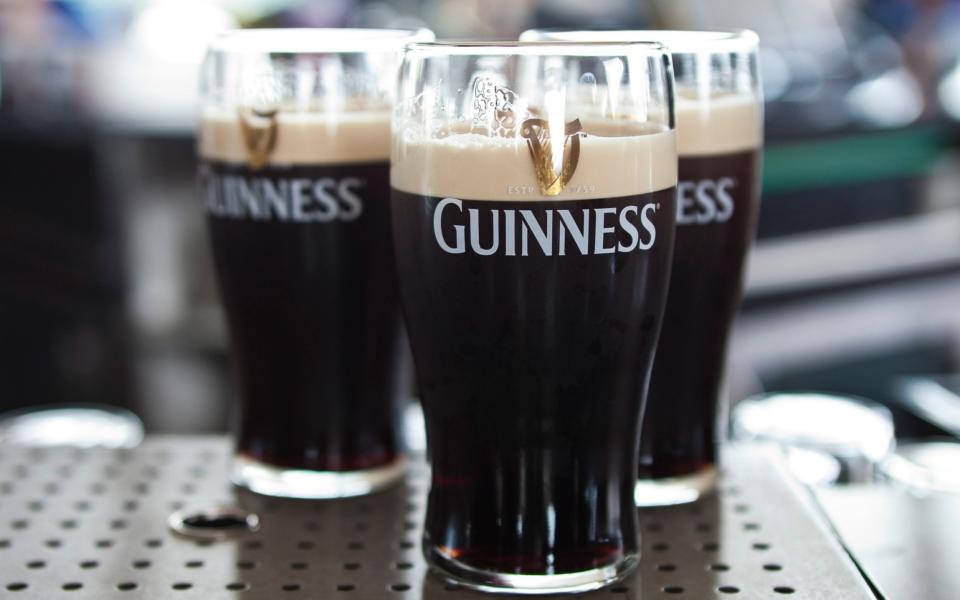
Diageo, the world's biggest spirits maker, has said it will wind down its business operations in Russia over the next six months.
The London-based company, which owns brands including Guinness, Smirnoff and Gordon's, is the latest western company to pull out of the country in response to its invasion of Ukraine.
A spokesman told Reuters: "Our focus will remain on supporting our employees in the region and providing them with enhanced redundancy terms, while ensuring we comply with local regulations."
Nike last week said it was pulling out of Russia completely after earlier closing its stores there, while McDonald's and Starbucks are among other major brands to cut ties.
03:36 PM
EY fined $100m after employees cheated on ethics exams
EY has been hit with a record $100m (£81.6m) fine after dozens of its employees cheated on an ethics exam, writes Simon Foy.
The Big Four accountant received the penalty after it admitted that nearly 50 of its auditors cheated on the ethics portion of the Certified Public Accountant (CPA) exam. Bosses at the firm then misled US regulators about the misconduct and hindered their investigation.
The fine is the biggest ever handed down by the US Securities and Exchange Commission to an accounting firm, twice the penalty paid by KPMG in 2019 for exam cheating and illegal tip-offs.
Gurbir Grewal, director of the SEC’s enforcement division, said: “It’s simply outrageous that the very professionals responsible for catching cheating by clients cheated on ethics exams.
“It’s equally shocking that Ernst & Young hindered our investigation of this misconduct… This action involves breaches of trust by gatekeepers within the gatekeeper entrusted to audit many of our nation’s public companies.”
Almost 50 EY auditors improperly shared answers to the ethics portion of the CPA exam between 2017 and 2021 and hundreds more cheated on continuing professional education courses, the SEC said.
03:24 PM
US consumer confidence drops to 16-month low
US consumer confidence dropped in June to the lowest since February 2021 as inflation continues to put a strain on American households.
The Conference Board's index fell to 98.7 from a downwardly revised 103.2 reading in May, falling short of analysts' forecasts.
Household sentiment remains weak as Americans contend with sky-high inflation that's outstripping wages.
But as the Federal Reserve moves to raise interest rates, higher borrowing costs could also dent purchases for big-ticket items such as homes, cars and household appliances.
03:10 PM
Reckitt Benckiser weighs dropping $7bn baby food sale

Boots may not be the only big-ticket deal that's falling by the wayside.
Consumer goods giant Reckitt Benckiser is said to be weighing up whether to shelve the sale of its infant nutrition business amid a turmoil on global financial markets.
Talks between the London-listed company and potential suitors have stalled in recent weeks, Bloomberg reports. The business, which owns brands including Enfamil, was expected to fetch around $7bn (£5.7bn).
Private equity firm Clayton Dubilier & Rice was among the few suitors to table a non-binding bid, while Blackstone, Carlyle, KKR and Bain Capital are all said to have looked at a potential deal.
But the process has been complicated by disagreements over valuation, a lack of available funding and an ongoing baby formula crisis in the US.
02:53 PM
Government backs British start-up vying to break China’s rare earth stranglehold

The Government has invested in a company hoping to end Britain's reliance on the Chinese rare earth metal industry.
Helen Cahill writes:
Livista Energy's bid to set up one of the first lithium refineries in Europe has won support from the Government. The new plant, set to be built in England, will provide the materials required to build batteries for electric vehicles.
Livista's co-founder Roland Getreide told the Financial Times the funding would help his company pick a location for the refinery.
He said: "The electrification of the car fleet means a whole new supply chain and the UK Government has chosen us to explain the process and how to build a refinery here."
Britain and the European Union have been trying to end their reliance on Chinese exports of rare earth metals, which are required to manufacture essential equipment for the healthcare sector and the military.
China provides around 98pc of the EU's requirement for rare earth metals after heavily investing in the production capacity needed for processing and exporting them.
02:36 PM
Wall Street opens higher
Wall Street has started the day's trading in positive trading after major banks boosted their dividends and China eased some Covid restrictions.
Morgan Stanley led gains in financial shares after raising its payout and saying it will repurchase as much as $20bn in shares. Airlines, cruise operators and casinos pushed higher as Beijing’s move helped investor sentiment.
The S& 500 rose 0.8pc at the opening bell, while the Dow Jones was up 0.9pc. The tech-heavy Nasdaq gained 0.7pc.
02:20 PM
UK mulls plan to limit cost of gas in electricity market
The Government is working on a plan to separate natural gas and electricity prices as part of a revamp of the market.
Business Secretary Kwasi Kwarteng said the current system – where gas-powered generation sets the price – no longer reflects the cost to produce electricity.
He said it was well-suited 40 years ago but called for change as more of the UK's energy comes from renewable sources like wind.
Surging gas prices have prompted ministers to look at reforming so-called "marginal pricing", where the most expensive megawatt needed to meet demand sets the power price for all generation.
Mr Kwarteng told MPs: "All our constituents are paying a price for electricity which is directly related to the marginal cost of gas production. It doesn't reflect the actual cost of generation."
One solution could be a market that separates renewable power generation from gas. Another would be to focus on the average cost of gas across different forms of generation.
02:03 PM
German economy could slump 12.7pc if Russia cuts gas supplies
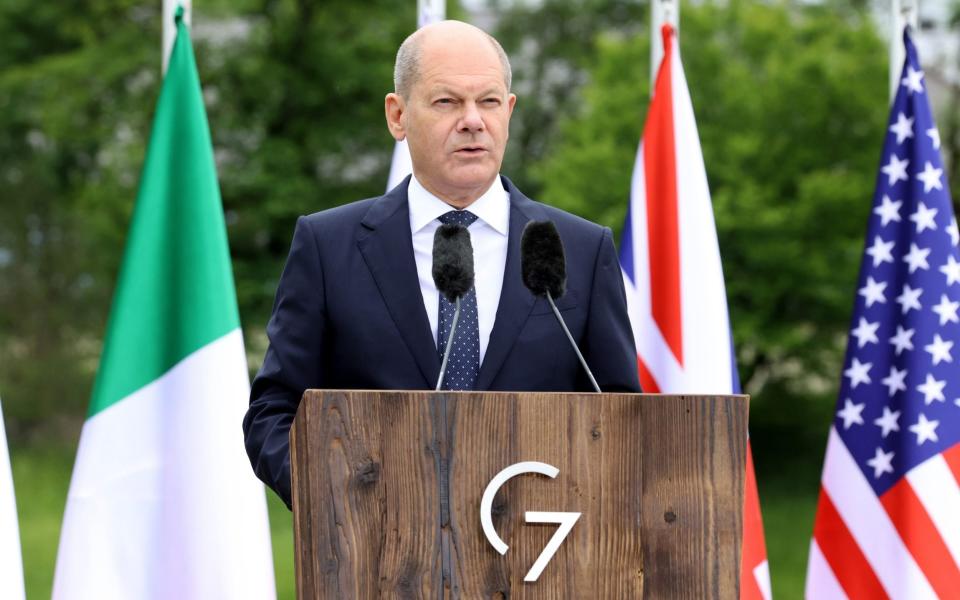
Germany's economy could contract by an eye-watering 12.7pc over the rest of this year if Russia cuts off gas supplies.
Lost output of goods and services could mount to as much as €193bn (£166bn) and as many as 5.6m jobs could be lost, according to a report by the Bavarian Industry Association.
It warned that the country's ceramic, chemical, food processing and steel industries could shrink more than 30pc in the second half of the year, and reiterated calls for new energy sources and a drive towards renewables.
The warning comes as Europe's biggest economy scrambles to refill storage sites in time for winter amid fears Putin could turn off the tap.
Germany has moved into the second phase of its emergency gas plan, while rationing has become a real possibility.
The BIA, whose members include BMW and Deutsche Telekom, said:
A delivery stop is leading us toward recession, with all the consequences for employment and social cohesion in our country.
We therefore urge that a natural gas embargo be prevented in so far as possible.
01:43 PM
British steel industry hammered as key sectors forced to rely on imports
Britain’s defence and nuclear industries are highly reliant on foreign steel, new figures show, as Boris Johnson considers whether to impose new tariffs on imports of the metal.
Howard Mustoe has more:
The UK is buying more than two-thirds of the steel needed for the two key industries from abroad, according to Government figures. The nuclear and defence industries spent £150m on the metal last year, of which just £45m came from British mills.
The disclosures come as Boris Johnson prepares to extend steel tariffs to protect the British industry. The Prime Minister has said the industry needs support as energy bills soar.
Critics say the plan will break international law and could worsen Britain’s cost of living crisis by pushing up costs.
In the late 1960s, the UK was the world’s fifth largest steel producer but it had dropped to 10th by the 1980s and 18th by 2015.
Britain’s steel industry is battling high energy costs and cheap imports from China, the world’s biggest producer.
01:27 PM
Boots owner abandons sale
Walgreens Boots Alliance has been forced to abandon its planned sale of the high street chemist after it failed to attract enough attention from suitors.
The US company said it received significant interest from prospective buyers, but blamed "unexpected and dramatic change" in global markets that had left bidders unable to scrape together enough cash.
Private equity firm Apollo and Indian giant Reliance were reportedly the only group to make a binding offer for Boots as part of a £5.5bn auction.
Rosalind Brewer, chief executive of WBA, said:
We have now completed a thorough review of Boots and No7 Beauty Company, with the outcome reflecting rapidly evolving and challenging financial market conditions beyond our control.
It is an exciting time for these businesses, which are uniquely positioned to continue to capture future opportunities presented by the growing healthcare and beauty markets.
The board and I remain confident that Boots and No7 Beauty Company hold strong fundamental value, and longer term, we will stay open to all opportunities to maximise shareholder value for these businesses and across our company.
12:27 PM
Hope for relief at the pump as fuel price surge slows
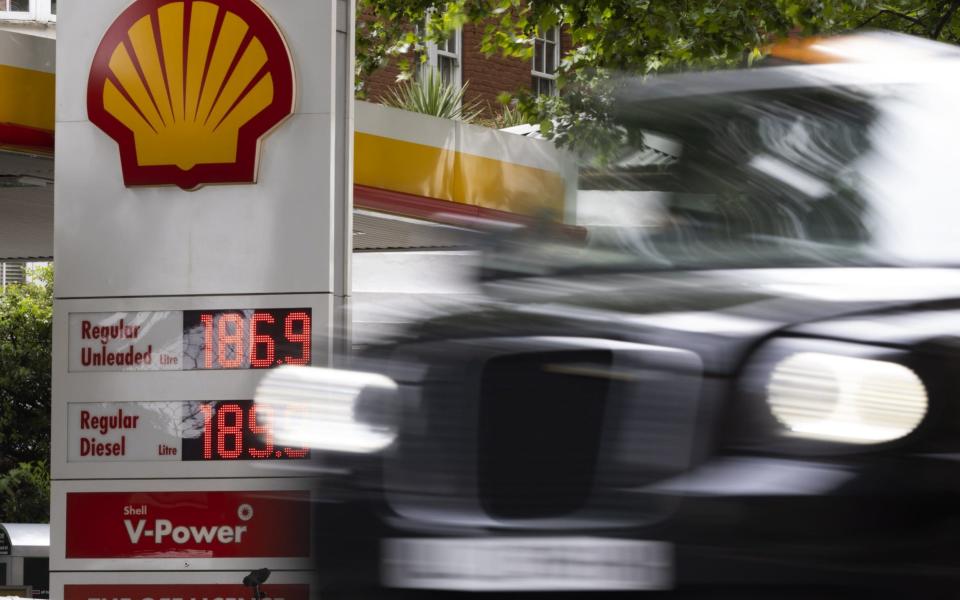
Petrol prices hit another record high yesterday, but a slower pace of increases could signal that they finally may be ready to fall.
The average price rose to 191.10p on Monday, up by half a penny, according to the RAC. That's the smallest daily increase in prices since June 20.
Diesel hit 198.96p – close to a record set over the past weekend.
Simon Williams, RAC fuel spokesman, said:
We strongly hope pump prices have peaked for the time being and will now start to decrease in line with wholesale prices which reduced last week. That, however, is the hands of retailers.
12:09 PM
US futures rise as China eases Covid rules
Wall Street looks set to push higher this afternoon as investor sentiment gets a boost from an easing of Covid restrictions in China.
China cut its mandatory quarantine period to 10 days from three weeks for inbound visitors. That came after cities such as Shanghai and Beijing eased their lockdown measures.
The move has helped stocks to rebound in the last few sessions, although traders still have a close eye on surging inflation and the risk of a global recession.
Futures tracking the S&P 500 rose 0.5pc, while the Dow Jones was up 0.6pc. The tech-heavy Nasdaq gained 0.4pc.
12:00 PM
Ageing UK population points to strain on Sunak
The population of England and Wales is ageing, highlighting the political and economic strain on the Government.
The number of people living in the two countries has risen 6.3pc since 2011 to a record 59.6m, according to the ONS. The proportion of the population older than 65 rose to 18.6pc from 16.4pc over the decade.
The figures show a spike in the working age population nearing retirement, which will add to demand on the Treasury for pension benefits and health services over the next decade.
But that may threaten Boris Johnson's stated aim of cutting taxes.
Using the first results from Census 2021, we’ve created an interactive article where you can select where you live and see how the population change compares with other local authority areas since the last census in 2011 https://t.co/Vi4eIdNlTw pic.twitter.com/gXBv9wHIW0
— Office for National Statistics (ONS) (@ONS) June 28, 2022
11:45 AM
South West Water under scrutiny over sewage treatment
South West Water has become the latest company targeted in an Ofwat investigation into suppliers' environmental performance and sewage treatment works.
Earlier this year the regulator said it had serious concerns over the sewage treatment works of five water suppliers – Anglian Water, Northumbrian Water, Thames Water, Wessex Water and Yorkshire Water.
David Black, Ofwat chief executive, said: "As we gather and analyse more information, including data on storm overflow spills, our concerns have grown further about South West Water's operation of its wastewater assets and environmental performance.
"As a result, we have opened an additional enforcement case into South West Water."
Shares in parent company Pennon fell as much as 7pc after the announcement. Pennon said it would work "openly and constructively" with Ofwat to comply with the investigation.
11:33 AM
Shoppers switching to cheap frozen food, says Sainsbury's
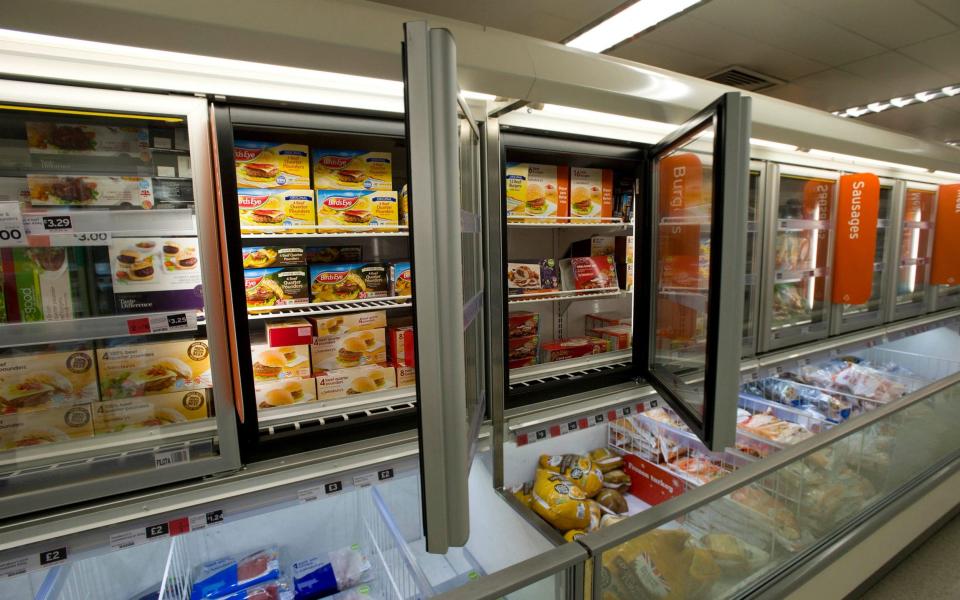
Cash-strapped Britons are buying more cheap frozen food to help reduce waste and cope with "unprecedented" increases in the cost of living.
That's according to the boss of Sainsbury's, who said shoppers were "watching every penny and every pound", doing more frequent but smaller shops and using technology to monitor spending and avoid "till shock" at the checkout.
Simon Roberts, chief executive of Sainsbury's, told Reuters: "There is some evidence of customers shopping (more) to own brand and also areas like frozen are increasing. People are looking at making sure that they don't incur any waste."
He said shoppers were buying "for now" only, and making sure they do not buy products they may not use.
Data out earlier this morning from NielsenIQ showed sales of frozen poultry jumped 12pc in the four weeks to June 18 as Brits tighten the purse strings.
11:13 AM
Kremlin: Gazprom could try to change contracts if West caps prices
Russian gas giant Gazprom could seek to revise its delivery contracts if western countries implement a price cap on Russian gas, the Kremlin has said.
Kremlin spokesperson Dmitry Peskov said he could not comment on how much the move – discussed by G7 leaders this week – would cost Russia.
10:56 AM
VW nears sale of electric car charging stake to Siemens

Volkswagen is said to be selling a 10pc stake in its electric car charging subsidiary to German industrial giant Siemens.
The Electrify America deal is likely to be announced later today alongside a $450m (£367m) investment in the network, Bloomberg reports.
VW set up Electrify America in the wake of its diesel emissions scandal. It has more than 3,500 charging ports in the US and Canada at 807 stations, and also has deals with Ford and Hyundai.
The proceeds of the sale will reportedly be used to help fund the German car maker's goal of doubling the number of electric vehicle charging stations it operates in North America.
10:47 AM
Amigo to return to lending with new brand
Troubled sub-prime lender Amigo is set to return to lending after a two-year hiatus amid claims it mis-sold loans.
Shares in the company pushed higher this morning after it announced plans for new loan products under a different brand.
Amigo suspended guarantor lending in March 2020 to work through a backlog of allegedly unaffordable loans. It spent about a year fighting for survival in the courts amid a deluge of customer complaints.
However, last month it was granted High Court approval for a rescue plan which included compensation for past customers.
Amigo said it plans to bring new lending products under the brand name RewardRate, subject to approval by the financial watchdog, the Financial Conduct Authority (FCA).
It wants to restart lending by February next year and will aim to raise cash over the next year in order to support plans to hand money back to creditors.
10:37 AM
Pound holds ground despite Brexit jitters
Sterling edged higher against the dollar this morning and was steady against the euro as it shrugged off a flare-up in Brexit risks and wider economic gloom.
Boris Johnson has pushed ahead with plans to pass legislation this year that will overturn some of the rules on post-Brexit trade with Northern Ireland.
Traders are also watching the Bank of England for signs of how it will tackle soaring inflation while trying to avoid tipping the UK into a recession.
The pound gained 0.2pc against the dollar to $1.2285. Against the euro it was little changed at 86.22p.
10:20 AM
Airbnb makes party ban permanent
Airbnb has said it's making a ban on parties at its properties permanent after seeing a sharp drop in reports of unauthorised gatherings since new rules were imposed in August 2020.
The company said there'd been a 44pc drop in the rate of party reports since it implemented the policy.
Airbnb originally brought in the ban to halt the spread of Covid infections, but it now wants to make the ban permanent as the summer travel season begins.
However, it will now remove its 16-person limit, allowing larger homes listed on the platform to be booked to full occupancy.
10:06 AM
PM: We're working on getting Ukraine's grain out
Boris Johnson has insisted that G7 leaders are working on finding a way of letting Ukraine export its grain.
Speaking ahead of a meeting with Emmanuel Macron, Mario Draghi, Olaf Scholz and Joe Biden, the Prime Minister said: "We're working on it, we're all working on it."
Millions of tonnes of Ukrainian grain have been left stranded due to a Russian blockade of its Black Sea ports, forcing exporters to use less efficient land routes. This is driving up the price of the staple and threatening a global food crisis.
In a further blow this morning, the latest report on US crop conditions missed expectations, fuelling concerns over the outlook for production and driving prices higher again.
09:48 AM
Train strikes hurt sandwich sales as millions stay home
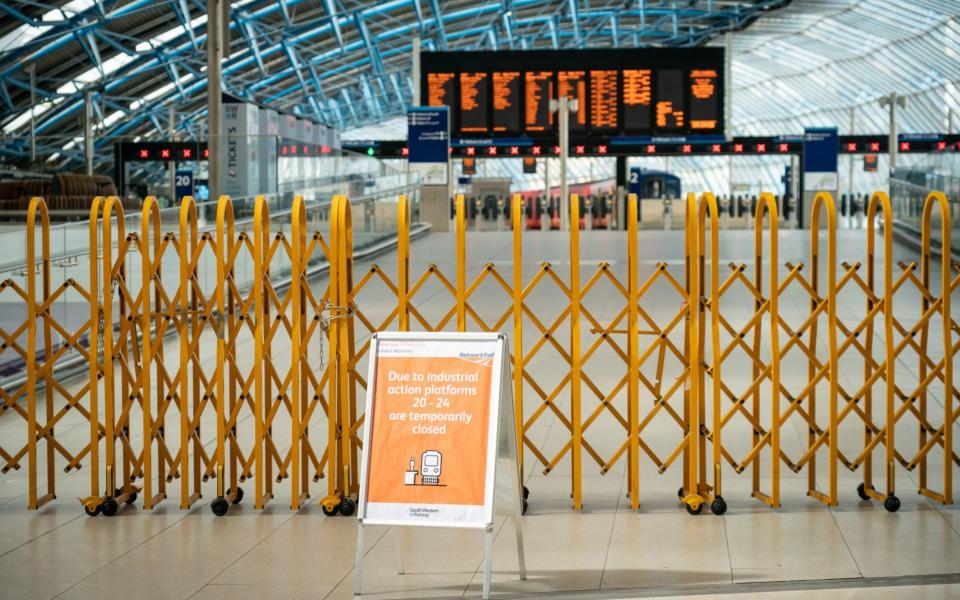
The worst train strike in more than 30 years wreaked havoc for commuters last week, but it also spelt bad news for Pret A Manger.
Sales of coffee, soup and sandwiches in the City and Canary Wharf were at 62pc of pre-Covid levels in the week to Thursday, according to Bloomberg's Pret Index.
That's the lowest since April and down from 88pc of pre-pandemic levels the previous week.
It was a similar story in the West End and train stations nationwide as the strikes forced millions of workers and shoppers to stay at home.
Almost half of workers in the City weren't at their desks on June 21 when train and Tube workers went on strike, according to data compiled by Google.
09:35 AM
Lagarde: ECB will go 'as far as necessary' to fight inflation
Christine Lagarde has vowed to go "as far as necessary" to tackle inflation as she warned prices would remain "undesirably high" for some time to come.
The ECB chief said soaring inflation was a "great challenge" but said the central bank what do everything it could to return it to the 2pc target.
LIVE: President Christine @Lagarde opens day 2 of the #ECBForum on Central Banking https://t.co/wWoKRmmTG0
— European Central Bank (@ecb) June 28, 2022
09:19 AM
Car industry asks for help with energy costs
The UK automotive industry has urged the Government to help soften the blow of surging energy costs as car makers try to transition to electric vehicles.
Car companies face a £90m increase in energy bills this year and already pay among the most for electricity in Europe, according to the Society for Motor Manufacturers and Traders (SMMT).
The group laid out a new plan for supporting the industry, calling on the Government to provide short-term support to help cover the costs, expand grants, extend tax deductions and to foster automotive skills training.
Mike Hawes, chief executive of the SMMT, said: “Help with energy costs now will help keep us competitive and be a windfall for the sector, stimulating investment in innovation, R&D, training – all reinvested in the UK economy.”
"From Covid impacts to component shortages, supply chain disruption to trade uncertainty & regulatory change to rising inflation, the challenges facing this sector are immense. Addressing the UK’s high energy costs is the industry’s number one ask"@MikeHawesSMMT on auto asks pic.twitter.com/6hy5Fq0LiP
— SMMT (@SMMT) June 28, 2022
09:10 AM
Oil extends gains on China's Covid easing
Oil has pushed higher for a third session this morning as an easing of Covid restrictions in China sparked expectations of higher demand.
Benchmark Brent crude gained 1pc to top $116 a barrel, while West Texas Intermediate traded just shy of $111.
Alongside China's easing restrictions, supply is also under threat from a political crisis in Libya and protests in Ecuador.
Opec meets later this week to discuss its output policy, while traders also have an eye on G7 plans to cap Russian energy prices.
09:02 AM
German consumer confidence hits all-time low
While things are looking grim for UK consumers, it’s not much better in Germany, either.
GfK’s consumer confidence barometer for the country dropped to -27.4 points for July – the lowest figure since the series started in 1991.
Rolf Buerkl, GfK consumer expert, said the decline was “above all” due to the rising cost of living, fuelled by Russia’s war in Ukraine.
Inflation rose to 7.9pc in May, the highest rate since German reunification in 1990 and well above the 2pc target of central banks.
Mr Buerkl also said “broken supply chains” were contributing to higher prices and darkening the mood among consumers.
⚠️ Record low German and UK consumer confidence. Everything is not fine in Europe...$EUR $GBP pic.twitter.com/hoDtmkPS7O
— Viraj Patel (@VPatelFX) June 28, 2022
08:55 AM
Brits switch to canned food as cost-of-living crunch deepens

Britons are increasingly switching to cheaper products in supermarkets as the cost-of-living crisis puts the squeeze on household budgets.
In the four weeks to June 18, sales of frozen poultry rose 12pc while sales of rice and grains increased 11pc, according to data from NielsenIQ.
Canned beans and pasta were up 10pc, gravy/stock and canned meat up 9pc and dry pasta jumped 31pc.
In contrast, sales of beers, wines and spirits – which jumped last year amid ongoing restrictions – fell 9.7pc, while general merchandise sales fell 6.1pc as shoppers trimmed discretionary spending.
The crisis means many struggling families will stop buying certain products altogether, while over a quarter said they’d shop more at discounters Aldi and Lidl.
Mike Watkins at Nielsen said: “Shoppers are starting to make different choices in how to compensate for their rising cost of living. For some households, the way to save money is to buy cheaper products.”
08:28 AM
FTSE risers and fallers
The FTSE 100 has jumped to its highest in more than two weeks as an easing of Covid restrictions in China boosted sentiment and drove up commodity prices.
The blue-chip index rose 0.8pc to its highest since June 10, with oil and mining stocks leading gains.
Rio Tino topped the index, gaining as much as 4pc, while Anglo American, Glencore and Antofagasta were all trading higher. Oil giants BP and Shell were also among the biggest boosts.
Prudential rose more than 3pc, with the wider insurance sector gaining ground after Rishi Sunak said the UK wants to reform insurer solvency rules quickly.
The domestically-focused FTSE 250 was up a more modest 0.3pc. Petrofac gained 5pc after it said its half-year trading was in line with expectations as an upswing in oil prices raised demand.
08:23 AM
Wise sets sights on 30pc revenue growth
Wise has forecast strong revenue growth after it enjoyed higher profits and a surge in customers during its first year as a listed company.
The money transfer firm, which floated in a record-breaking London listing last July, reported pre-tax profits of £43.9m for the year to the end of March, while revenues grew by a third to £556..
Its customer base grew 29pc to 4.6m in the final three months, with the group transferring 40pc more money for customers over the year, at £76bn
Wise also said it aims to grow revenues by between 30pc and 35pc over the next financial year as it hailed a "strong start".
But it comes a day after Wise revealed its co-founder and chief executive Kristo Kaarmann was being investigated by the City watchdog over his status as a so-called deliberate tax defaulter.
Read more: Millionaire Wise chief investigated over tax default
08:13 AM
Heathrow warns passengers travel chaos will last until 2026
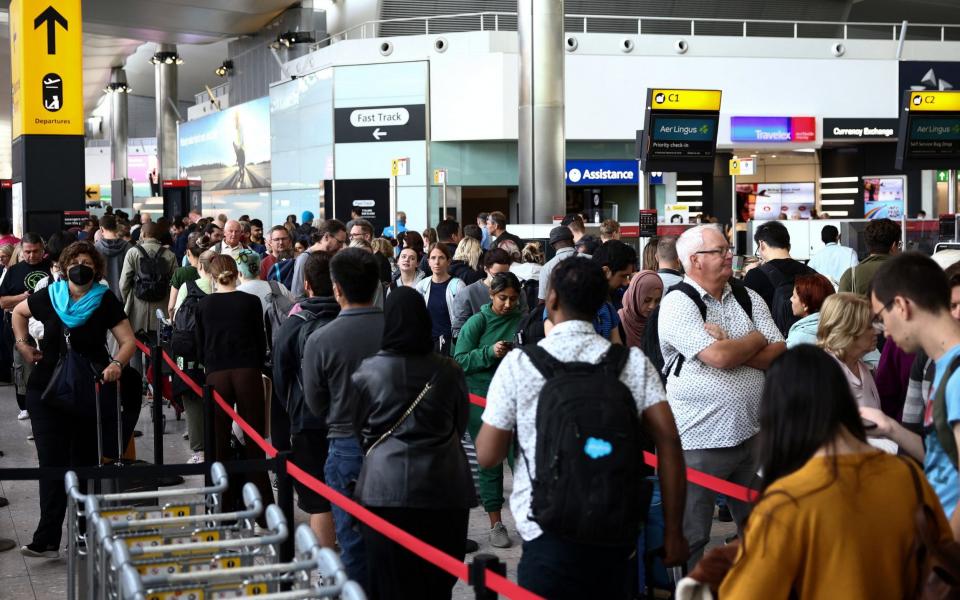
Heathrow passengers face “a worse experience”, the airport has warned, after it was told by the regulator to cut charges levied on travellers amid a surge in demand for flights.
Oliver Gill has the details:
The Civil Aviation Authority (CAA) said that the cap on landing fees charged per passenger at Heathrow will fall from £30.19 to £26.31 by 2026, following a furious lobbying effort by the airport and airlines.
Airlines have long argued that Heathrow is one of the most expensive airports in the world and urged the CAA to resist its demands to raise charges to more than £40 per passenger.
Heathrow, meanwhile, has said that it needs to raise the fees to make sure the airport does not fall into disrepair.
Richard Moriarty, chief executive of the CAA, said: "Today's announcement is about doing the right thing for consumers. We have listened very carefully to both Heathrow Airport and the airlines who have differing views to each other about the future level of charges.
“Our independent and impartial analysis balances affordable charges for consumers, while allowing Heathrow to make the investment needed for the future."
However, Heathrow hit back at the decision, saying that it would result in further chaos to passengers at a time when thousands of customers are being hit by widespread cancellations owing to staff shortages.
08:10 AM
FTSE 100 jumps at the open
The FTSE 100 has opened sharply higher this morning as stocks continue to rebound from a recent sell-off.
The blue-chip index jumped just shy of 1pc as markets opened to 7,328 points.
07:57 AM
Lottery firm Camelot feels cost-of-living squeeze
Outgoing National Lottery operator Camelot has revealed a fall in ticket sales as it warned consumers had "tightened their belts" amid the cost-of-living crisis.
Camelot, which has launched legal action against the Gambling Commission after losing the lottery licence to rival Allwyn, said sales fell 3pc to £8.1bn in the year to the end of March.
The company blamed the decline partly on the end of Covid restrictions, but also "growing economic uncertainty" as inflation continues to soar.
However, Camelot said £1.9bn was generated for good causes over the year, making it the second best total ever raised.
In March, Camelot lost the licence to operate the lottery from 2024 after 30 years running the game.
The five-year licence was awarded to Allwyn, previously known as Sazka, which runs lotteries in Austria, Italy and Greece, and proposes to cut the cost of UK tickets from £2 to £1.
07:49 AM
Royal Mail workers to vote on biggest strike of summer

The biggest strike of the summer has moved one step closer to reality as ballots were sent out to 115,000 postal workers.
The Communication Workers Union, which represents the posties, is demanding a bigger pay rise in line with inflation.
It's rejecting Royal Mail's offer of a 2pc increase, describing their treatment as "despicable".
If workers vote for the walkout, it could result in the biggest industrial action this summer. The CWU is also involved in pay disputes at BT and the Post Office.
A spokesman for the CWU said:
Britain’s postal workers are being forced into accepting a massive pay cut by the same people they have generated incredible profits for.
Our members are going to food banks while bosses reward themselves with advance bonuses. It is an unjust, unsustainable way to treat people.
We have no doubt that workers will defy this despicable treatment, stand up for themselves and vote to begin the biggest strike of this summer.
07:40 AM
G7 pushes for Russian gas price cap
Good morning.
The G7 is preparing to tighten the screws on the Kremlin's coffers with a cap on Russian energy prices.
Leaders are expected to announce plans today for a cap on Russian gas prices. That's on top of a mechanism to cap prices on oil imports from the country.
Limiting Moscow's profits from energy has been one of the main topics of discussion so far at the three-day G7 summit in Bavaria.
It comes as the EU looks for ways to reduce energy demand amid concerns lower Russian gas flows could lead to shortages this winter and force countries to roll out rationing.
5 things to start your day
1) Bricking it: shortages push builders into bankruptcy Construction companies face going under despite post-lockdown building boom
2) Councils forced to ‘rip up financial plans’ as inflation adds £800m to costs Vital public services are at risk amid a cost of living crisis
3) Net zero red tape to be ditched as Britain returns to coal Checks on fossil fuel emissions to be watered down under Whitehall plans
4) Break-up of nuclear sub contractor to start within months of US takeover Rapid sale expected for non-defence divisions at Ultra Electronics
5) New owner of Britain’s TV masts vows to keep channels on air despite streaming threat Digital 9 pays £460m for a 48pc stake in monopoly broadcaster of digital freeview TV
What happened overnight
Hong Kong stocks opened slightly down this morning. The Hang Seng Index dipped 0.4pc. The Shanghai Composite Index was flat, while the Shenzhen Composite Index on China's second exchange also barely moved.
Tokyo stocks traded higher, with the benchmark Nikkei 225 index up 0.4pc.
Coming up today
Corporate: Biffa (full-year results); ICG Enterprise Trust, Petrofac (trading statement)
Economics: BRC shop price index (UK), GfK consumer confidence (Ger), house price index (US), consumer confidence (US)

 Yahoo Finance
Yahoo Finance 